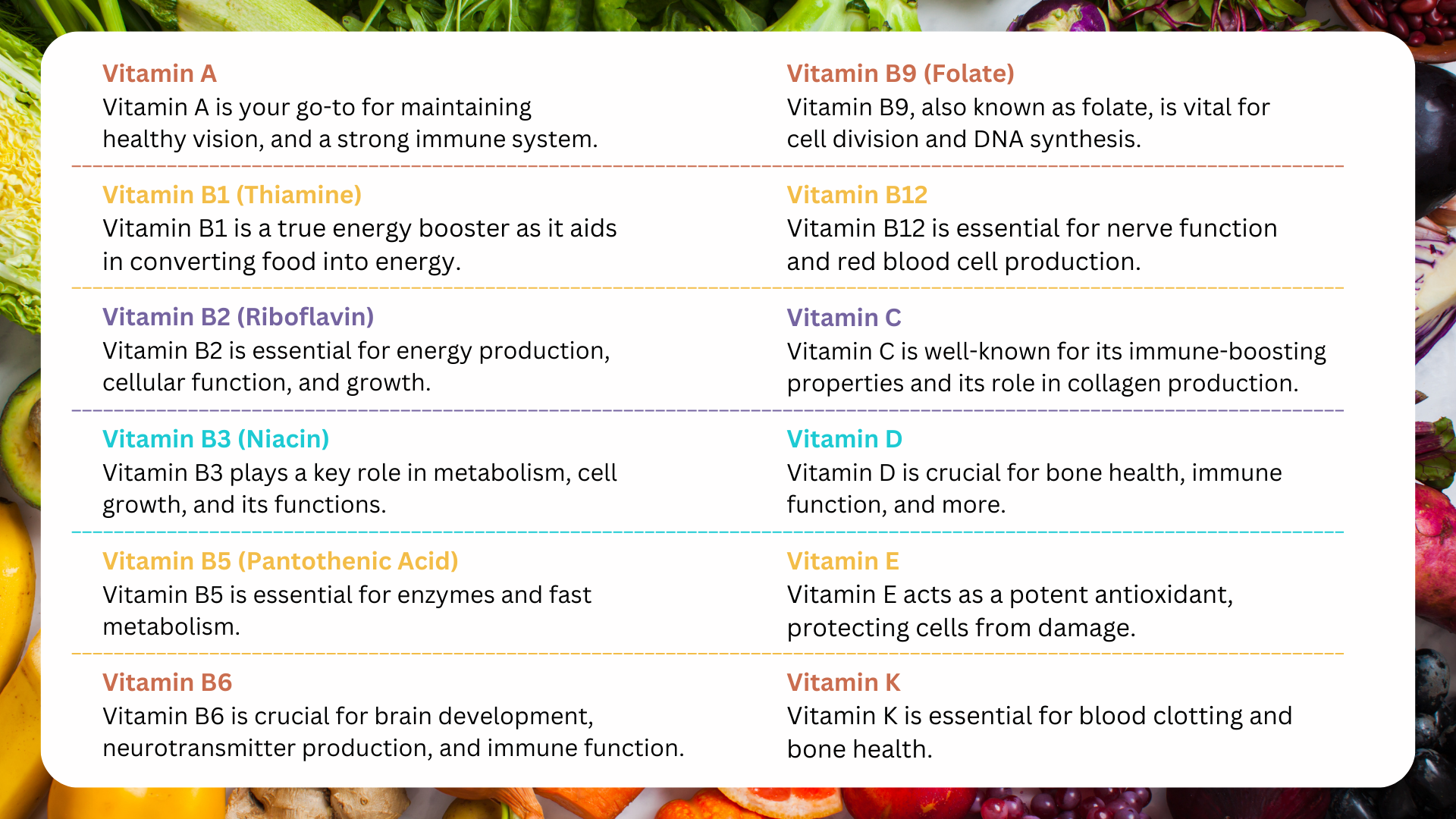Welcome to the Vitamin Ultimate Guide brought to you by Vivoo! In this guide, we'll dive into the world of vitamins, exploring their importance for your health and well-being. Vitamins are essential nutrients that your body needs in small amounts to function properly.
They play a crucial role in various bodily functions, from immune support to energy production. Let's start our journey by understanding the basics of vitamins and then delve into the two main groups and individual vitamins that your body relies on.
What are Vitamins?
Vitamins are organic compounds that your body needs to perform vital functions. They're like tiny superheroes that assist your body in growth, development, and overall maintenance. Vitamins come from various sources, including food and supplements. Your body doesn't produce enough of these compounds on its own, so it's important to get them from your diet.
What are the Two Main Groups of Vitamins?
Vitamins are broadly categorized into two groups: water-soluble vitamins and fat-soluble vitamins. Water-soluble vitamins, such as Vitamin C and the B vitamins, dissolve in water and aren't stored in the body. This means you need a regular intake of them. Fat-soluble vitamins, like Vitamins A, D, E, and K, dissolve in fat and can be stored in your body's fatty tissues or liver. Let's now take a closer look at the 13 individual vitamins that fall within these groups.

The 13 Vitamins: Exploring Their Roles and Daily Requirements
In the world of wellness, understanding the roles and daily requirements of the 13 essential vitamins is key to maintaining optimal health. Let's delve deeper into each of these vitamins, their functions, and how much of them you need on a daily basis.
Vitamin A:
Vitamin A is your go-to for maintaining healthy vision, and a strong immune system. It's available in two forms: preformed Vitamin A (retinoids) found in animal products, and provitamin A (carotenoids) found in colorful fruits and vegetables. The recommended daily intake is around 700 to 900 micrograms for adults.
Vitamin B1 (Thiamine):
Vitamin B1 is a true energy booster as it aids in converting food into energy. It's also important for nerve health. You can find it in whole grains, legumes, and lean meats. The daily requirement for adults is about 1.1 to 1.2 milligrams.
Vitamin B2 (Riboflavin):
Vitamin B2 is essential for energy production, cellular function, and growth. Dairy foods, lean meats, eggs, and leafy greens are good sources of this vitamin. You should aim for a daily intake of about 1.1 to 1.3 milligrams for adults.
Vitamin B3 (Niacin):
Vitamin B3 plays a key role in metabolism, cell growth, and its functions. It's available in two forms: nicotinic acid and niacinamide. Poultry, fish, nuts, and legumes are great sources. The recommended daily intake ranges from 14 to 16 milligrams for adults.
Vitamin B5 (Pantothenic Acid):
Vitamin B5 is essential for enzymes and fast metabolism. It's widespread in various foods, including chicken, avocados, yogurt, and eggs. Adults should aim for a daily intake of around 5 milligrams.
Vitamin B6:
Vitamin B6 is crucial for brain development, neurotransmitter production, and immune function. You can find it in bananas, poultry, and chickpeas. The daily requirement for adults is about 1.7 milligrams.
Vitamin B7 (Biotin):
Vitamin B7 or widely known as Biotin supports healthy hair, skin, and nails. It's found in eggs, nuts, and whole grains. Adults need approximately 30 micrograms daily.
Vitamin B9 (Folate):
Vitamin B9, also known as folate, is vital for cell division and DNA synthesis. It's particularly important during pregnancy. Dark green leafy greens and legumes are great sources. The recommended amount of daily intake is around 400 micrograms for adults.
Vitamin B12:
Vitamin B12 is essential for nerve function and red blood cell production. It's primarily found in animal products like meat, fish, and dairy. Adults should aim for a daily intake of about 2.4 micrograms.
Vitamin C:
Vitamin C is well-known for its immune-boosting properties and its role in collagen production. It's abundant in citrus fruits, strawberries, and bell peppers. The daily requirement for adults is around 75 to 120 milligrams for females and 90 to 125 milligrams for males.
Vitamin D:
Vitamin D is crucial for bone health, immune function, and more. While sunlight is a natural source, fatty fish and fortified products like dairy also provide Vitamin D. Adults typically need about 600 international units (IU) daily.
Vitamin E:
Vitamin E acts as a potent antioxidant, protecting cells from damage. Nuts, seeds, and spinach are rich sources. The recommended daily intake for adults is approximately 15 milligrams.
Vitamin K:
Vitamin K is essential for blood clotting and bone health. Leafy greens like kale, spinach, and broccoli, provide this vitamin. Adults need around 90 to 120 micrograms daily.
How to Check Vitamin Levels?
Checking your vitamin levels is an essential step in maintaining your overall health and well-being. By understanding your body's vitamin status, you can make informed decisions about your diet and lifestyle. Various methods, such as blood tests, can accurately measure your vitamin levels and provide insight into potential deficiencies.
How Do Vitamin Test Kits Work?
Vitamin test kits offer a convenient and efficient way to assess your vitamin levels from the comfort of your home. These kits typically involve collecting a sample, like a blood spot or urine, and sending it to a lab for analysis. Once the results are in, you'll receive valuable information about your vitamin status and recommendations for improvement if needed.
Types of Vitamin Test Strips
Vitamin test strips are a user-friendly option for checking your vitamin levels. These strips, designed for specific vitamins, allow you to monitor your levels quickly and easily. By following the instructions on the packaging, you can obtain instant results and gain insights into your vitamin status.
At-home vitamin deficiency blood test strips
At-home blood tests are a type of vitamin test that helps you check whether you are getting enough of a variety of vitamins and minerals. It involves pricking your finger for a blood sample and shipping this to a lab for testing. You typically get your results in a 1-2 week period by email. You might not want to take a blood test if you do not want to experience the pain of pricking yourself or if you are scared of needles. If that’s the case, then you can check out another method of checking your vitamin levels with at-home urine test kits.

Vivoo
If you’re looking for a way to find out your body’s vitamin and mineral levels from home and get advice on how to improve your vitamin levels, then Vivoo tests are the perfect choice for you!
Vivoo is an at-home urine test that works with an app that helps you improve your body’s wellness based on real-time data on 9 key wellness parameters: vitamin C, calcium, magnesium, sodium, water, oxidative stress, urine pH, ketones, and protein. After urinating on the strip, you can scan your strip to the app to get results in 90 seconds. There’s no need to ship samples to the lab, making it simple and effective!
The best part is that you can get personalized nutritional and lifestyle advice prepared by dietitians to boost your wellness, as well as order personalized supplements through the app l to boost your levels of low-scoring parameters!
Take a look at the Vivoo website to see all of the things we have to offer! If you are keen on checking your body’s levels of a number of nutrients and parameters, then you’re in the right place!
What is Vitamin Deficiency?
Vitamin deficiency occurs when your body doesn't receive an adequate amount of a specific vitamin. This can lead to various health problems and impact your overall well-being. Recognizing the signs and symptoms of vitamin deficiencies is crucial for maintaining optimal health.
What Are the Symptoms of Vitamin Deficiency?
Vitamin deficiencies can manifest in a range of symptoms, which vary depending on the specific vitamin lacking in your body. Common symptoms include fatigue, muscle weakness, brittle nails, hair loss, and even mood disturbances.
Here are some common symptoms associated with deficiencies of various vitamins:

Vitamin A deficiency:
- Night blindness or poor vision in low light
- Dry, scaly skin
- Increased susceptibility to infections
Vitamin D deficiency:
- Bone pain or muscle weakness
- Increased susceptibility to infections
- Depression
Vitamin E deficiency:
- Muscle weakness
- Nerve damage
- Impaired immune function
Vitamin K deficiency:
- Easy bruising or bleeding
- Bleeding gums
Vitamin C deficiency (scurvy):
- Weakness
- Swollen, bleeding gums
- Joint pain
- Slow wound healing
Vitamin B1 (Thiamine) deficiency:
- Muscle weakness
- Memory issues
- Digestive problems
Vitamin B2 (Riboflavin) deficiency:
- Cracked or sore lips
- Inflammation and redness of the lining of the mouth and throat
Vitamin B3 (Niacin) deficiency:
- Pellagra: skin rashes, digestive issues, mental confusion
- Headache
- Memory impairment
Vitamin B6 deficiency:
- Nervous system disorders
- Skin problems
- Depression
Vitamin B12 deficiency:
- Anemia
- Fatigue
- Memory and cognitive issues
Folate (Vitamin B9) deficiency:
- Anemia
- Fatigue
- Neural tube defects during pregnancy
- Digestive problems
What Causes Vitamin Deficiency?
Several factors can contribute to vitamin deficiencies. Poor diet, certain medical conditions, medication use, and even inadequate sun exposure (for vitamin D) can all play a role. Understanding the causes of vitamin deficiencies empowers you to take proactive steps to prevent them.
How to Test Vitamin Deficiency?
If you suspect a vitamin deficiency, consult a healthcare professional. They can recommend appropriate tests based on your symptoms and health history. Blood tests, in particular, are commonly used to determine vitamin deficiencies accurately.

How Is Vitamin Deficiency Reversible?
Reversabling a vitamin deficiency typically involves dietary changes, supplements, or a combination of both. Your healthcare provider will tailor a personal plan based on your specific deficiency and needs. Adhering to their recommendations can help restore your vitamin levels to a healthy range.
What are Fat-Soluble Vitamins?
Fat-soluble vitamins, including vitamins A, D, E, and K, are a group of essential vitamins that your body needs for various functions. These vitamins are stored in fat tissues and the liver, and they play crucial roles in maintaining your immune system, bone health, vision, and more.














